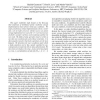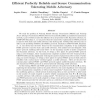82 search results - page 15 / 17 » Tight bounds for clock synchronization |
SRDS
1999
IEEE
13 years 12 months ago
1999
IEEE
Validating distributed systems is particularly difficult, since failures may occur due to a correlated occurrence of faults in different parts of the system. This paper describes ...
DSN
2006
IEEE
13 years 11 months ago
2006
IEEE
This paper establishes tight bounds on the best-case time-complexity of distributed atomic read/write storage implementations that tolerate worst-case conditions. We study asynchr...
PODC
1998
ACM
13 years 11 months ago
1998
ACM
A contract is a non-repudiable agreement on a given contract text, i.e., a contract can be used to prove agreement between its signatories to any verifier. A contract signing sche...
IPL
2006
13 years 7 months ago
2006
We study the problem of Perfectly Reliable Message Transmission (PRMT) and Perfectly Secure Message Transmission (PSMT) between two nodes S and R in an undirected synchronous netw...
EDCC
2010
Springer
14 years 14 days ago
2010
Springer
: While lots of consensus algorithms have been proposed for crash-prone asynchronous message-passing systems enriched with a failure detector of the class Ω (the class of eventua...


